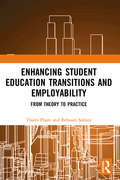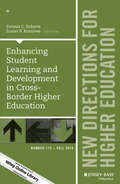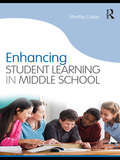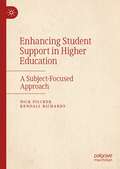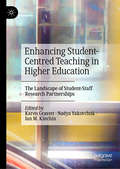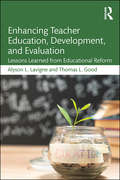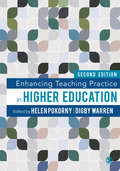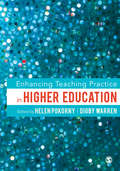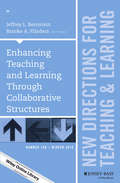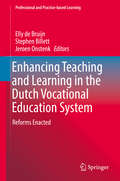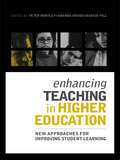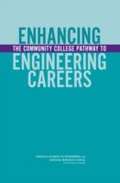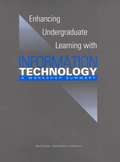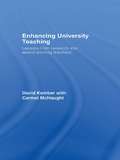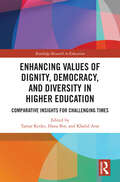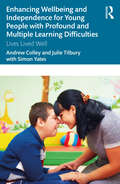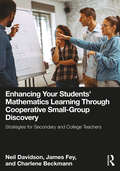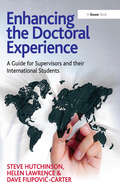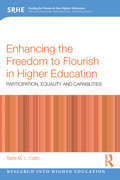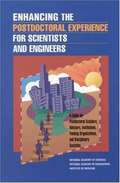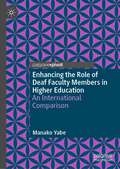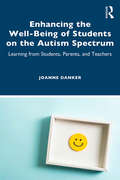- Table View
- List View
Enhancing Student Education Transitions and Employability: From Theory to Practice
by Thanh Pham Behnam SoltaniThis book explores student education transition and employability negotiation experiences in various contexts. It explores determinants of student transitions at three levels including macro, meso and micro but focuses on exploring affordances, constraints and strategies at the micro level. The framework underpinning the explorations at the micro level covers a range of different forms of capital including human, culture, social, identity, psychological and agentic. The book is unique in three ways. First, it consists of chapters about critical discussion, empirical research and practical guidance about student transition experiences. The critical discussion and empirical research chapters explore and obtain insights about the complexity of student transitions and develop conceptual frameworks that guide the development of applicable practices. The book is, therefore, a useful resource for policy makers, institutions, academics, professionals and students. Second, it provides insights about how student transitions are determined by a range of factors at different levels. These insights extend discussions about student transitions in the current literature which have mainly explored impacts of policies, institutional programmes and human capital. Finally, it is international in focus because it draws on research with different cohorts of students and graduates in different contexts. Insights provided in the book are, therefore, rich, diverse and comparative.
Enhancing Student Learning and Development in Cross-Border Higher Education: New Directions for Higher Education, Number 175 (J-B HE Single Issue Higher Education)
by Susan R. Komives Dennis C. RobertsHigher education is expanding, internationalizing, and changing rapidly around the world. Yet, many of the broader international higher education community and funders are unaware that much of what the United States has achieved in quality higher education derives from the student affairs staff. This volume addresses the opportunities and challenges in creating student learning and development programs and strategies that are culturally appropriate and use best practices from regions around the world. This volume includes: suggestions using the whole institutional environment—curriculum and co-curriculum; examples from China, Mexico, Singapore, South Africa, and the United Kingdom; and holistic and engaging approaches through student affairs, student development, and student services. This will be of interest to all those who value quality higher education no matter what their role. The intent is to convince broader constituencies of the merit of enhancing the student experience so that students worldwide will benefit from enhanced learning and development opportunities.This is the 175th volume of the Jossey-Bass quarterly report series New Directions for Higher Education. Addressed to presidents, vice presidents, deans, and other higher education decision makers on all kinds of campuses, it provides timely information and authoritative advice about major issues and administrative problems confronting every institution.
Enhancing Student Learning in Middle School
by Martha CasasA comprehensive introduction to middle school teaching, this textbook focuses explicitly on instructional strategies that encourage adolescents to become active participants in their own learning within a world of accountability and standardized testing. The author, an experienced middle school teacher and teacher educator, takes a constructivist approach to teaching that considers the whole child, including the emotional, psychological, social, and cultural variables uniquely associated with adolescence. The text examines the full range of middle school topics, from the development and diversity of middle school learners, to the structures, curriculum, and management of the classroom itself. Special features include: "Empowering Middle School Students to Take Ownership of their Learning," "Teaching Scenario," "Key Points," and "Creating an Anti-Oppressive Atmosphere in Your Classroom" textboxes help teachers gain a clearer understanding of content presented and encourage them to become reflective practitioners. Callouts throughout explicitly link chapter content to NMSA standards. Discussion of the unique challenges of actively engaging bilingual students, special needs students, and students exhibiting antisocial behavior. Accounts about middle school students illustrate the ways adolescents think about school and learning. A chapter that focuses on ways teachers can apply the general teaching strategies to specific subject areas. Sample Lesson Plans, Focus Questions, Chapter Summaries, Journal Entries, and Student Activities/Assignments are included throughout to encourage readers to actively participate with the text.
Enhancing Student Support in Higher Education: A Subject-Focused Approach
by Nick Pilcher Kendall RichardsThis book is about supporting students in Higher Education using language, and specifically using a combination of written text based linguistic approaches alongside and with other non-text related languages. The authors call this a beyond-text subject based approach and argue that this can more effectively help students. The book first outlines and describes a ‘paradigm of linguistics’ that sees support as being only possible through linguistics written text approaches. It then describes how the authors have found through their own research studies that such approaches do not go far enough to best support students. They offer alternatives and justify them theoretically and empirically, and also suggest ways in which others can use similar approaches to best support students in HE. This book will be of interest to practitioners, students, teachers and researchers in the fields of Applied Linguistics, TESOL, English Medium Instruction (EMI), EAP and language education policy.
Enhancing Student-Centred Teaching in Higher Education: The Landscape of Student-Staff Research Partnerships
by Ian M. Kinchin Karen Gravett Nadya YakovchukThis book explores student-staff partnerships through a breadth of co-authored research projects. There is a significant gap in current literature regarding student-staff partnerships, both in the sharing of examples as well as in the examination of partnership working and its impact. Organised into four thematic sections, the editors and contributors highlight the diversity of routes students and staff can take to work in partnership, as well as how research, learning and teaching can be co-created. Written by both university staff and student researchers, the chapters consider the benefits of student-staff partnerships as an antidote to consumerist visions of higher education, and a way of celebrating the potential of students and their voices. This book will be of interest and value to scholars of student-staff partnerships.
Enhancing Teacher Education, Development, and Evaluation: Lessons Learned from Educational Reform
by Thomas L. Good Alyson L. LavigneEnhancing Teacher Education, Development, and Evaluation examines the complex role that recent educational reforms have played in the teaching profession. The failure of programs like Race to the Top to benefit teaching and learning outcomes has yielded many questions about what went wrong and how a research-based plan for true systemic progress could actually work. Covering inaccurate narratives about schools and student achievement, evidence for teacher effectiveness, and the history and repercussions of Race to the Top, this book culminates with a proposal for future research and policy initiatives that more accurately and more equitably prioritize the measurement and improvement of teaching and learning. Five concise yet comprehensive chapters invite teacher and principal educators, teachers and school leaders in training, district administrators, policymakers, and other stakeholders to better understand the implications of and possible paths beyond misguided reform efforts. An overview of the recent past and an inspiration for the immediate future, this definitive analysis offers insights into how more reasonable, empirically derived strategies will ultimately foster more successful schools.
Enhancing Teaching Practice in Higher Education
by Tom Burns Sandra Sinfield Steven Cranfield Helen Pokorny Digby Warren Ben Goldsmith Dave Griffiths Sarah Flynn Debbie Holley David Fevyer Kathy Harrington Susannah McKee Matt Scandrett Julian Ingle Sibyl Coldham Pauline Armsby Johanna Payton Jennifer Bright Rebecca EliahooThis book integrates a wide body of theory and pedagogical research to enrich and empower teaching in universities, with a focus on transformational practice and education for social justice. In this fully updated second edition, you will be provided with ideas and practical strategies drawn from literature and real-life experience across a range of academic disciplines. This second edition includes: · Two new chapters on: inspiring learning through technologies, and holistic and creative pedagogies · Approaches to decolonising the curriculum and working with student diversity and partnership · Innovations in learning environments including responses to the pandemic, university writing and developing learning through, and for, work · A new feature: case studies in every chapter to illustrate theoretical ideas across disciplines
Enhancing Teaching Practice in Higher Education
by Tom Burns Sandra Sinfield Steven Cranfield Helen Pokorny Digby Warren Ben Goldsmith Dave Griffiths Sarah Flynn Debbie Holley David Fevyer Kathy Harrington Susannah McKee Matt Scandrett Julian Ingle Sibyl Coldham Pauline Armsby Johanna Payton Jennifer Bright Rebecca EliahooThis book integrates a wide body of theory and pedagogical research to enrich and empower teaching in universities, with a focus on transformational practice and education for social justice. In this fully updated second edition, you will be provided with ideas and practical strategies drawn from literature and real-life experience across a range of academic disciplines. This second edition includes: · Two new chapters on: inspiring learning through technologies, and holistic and creative pedagogies · Approaches to decolonising the curriculum and working with student diversity and partnership · Innovations in learning environments including responses to the pandemic, university writing and developing learning through, and for, work · A new feature: case studies in every chapter to illustrate theoretical ideas across disciplines
Enhancing Teaching Practice in Higher Education
by Helen Pokorny Digby WarrenLecturers, download your inspection copy here. This book explores ways in which pedagogical research, theory, models and frameworks can be used pragmatically to enhance teaching practice in higher education. It provides practical strategies, ideas, techniques and approaches drawn from literature and real-life experience, using examples from a variety of disciplines. Cross-cutting themes include developing resilience and care for ourselves, our colleagues and our students, engaging with diversity in teaching and promoting dialogue and enquiry. It also addresses the dimensions of the UK Professional Standards Framework. Key coverage includes: Models of course and learning design and evaluation Teaching in different contexts including lectures and small groups, laboratory, studio and practice settings and supervising student research Enhancing assessment and feedback, student engagement and academic writing through inclusive practice Promoting participation in blended learning Developing students’ work-relevant skills, attributes and practices Approaches to professional development including the role of mindfulness in teaching This is essential reading for lecturers on Higher Education Academy-accredited programmes, such as PGCTLHE, PGCAP, PG Cert HE, and for staff seeking HEA fellowship through experience-based routes, or who wish to develop more scholarly approaches to their practice.
Enhancing Teaching Practice in Higher Education
by Helen Pokorny Digby WarrenLecturers, download your inspection copy here. This book explores ways in which pedagogical research, theory, models and frameworks can be used pragmatically to enhance teaching practice in higher education. It provides practical strategies, ideas, techniques and approaches drawn from literature and real-life experience, using examples from a variety of disciplines. Cross-cutting themes include developing resilience and care for ourselves, our colleagues and our students, engaging with diversity in teaching and promoting dialogue and enquiry. It also addresses the dimensions of the UK Professional Standards Framework. Key coverage includes: Models of course and learning design and evaluation Teaching in different contexts including lectures and small groups, laboratory, studio and practice settings and supervising student research Enhancing assessment and feedback, student engagement and academic writing through inclusive practice Promoting participation in blended learning Developing students' work-relevant skills, attributes and practices Approaches to professional development including the role of mindfulness in teaching This is essential reading for lecturers on Higher Education Academy-accredited programmes, such as PGCTLHE, PGCAP, PG Cert HE, and for staff seeking HEA fellowship through experience-based routes, or who wish to develop more scholarly approaches to their practice.
Enhancing Teaching and Learning Through Collaborative Structures: New Directions for Teaching and Learning, Number 148 (J-B TL Single Issue Teaching and Learning)
by Jeffrey L. Bernstein Brooke A. FlindersIn this volume, the authors contend that teaching and learning must be viewed as communal work, whether conducted in one classroom, with colleagues at a programmatic level, or when tackled on a university-wide scale. When educators partner with faculty colleagues or students in teaching and learning, it becomes possible to improve the educational experiences of all students, model professional behaviors that students will soon be expected to embrace, and positively impact graduates, peers, campuses, and even communities at large. By intentionally creating collaborative structures for communal work to occur, educators can broaden access to opportunities for students, improve engagement experiences within the community, and improve faculty support and scholarship.Exploring multiple perspectives on collaborative structures in teaching and learning, this volume discusses ways to consider the collaborative structures within education that allow for shared contributions to teaching and learning. It discusses the need for practitioners to view teaching and learning as truly communal work, regardless of the type of setting.This is the 148th volume of this Jossey-Bass higher education series. It offers a comprehensive range of ideas and techniques for improving college teaching based on the experience of seasoned instructors and the latest findings of educational and psychological researchers.
Enhancing Teaching and Learning in the Dutch Vocational Education System
by Stephen Billett Elly De Bruijn Jeroen OnstenkThis book discusses how the Dutch vocational education system has undergone significant waves of reform driven by global imperatives, national concerns and governmental policy goals. Like elsewhere, the impetuses for these reforms are directed to generating a more industry-responsive, locally-accountable and competence-based vocational education system. Each wave of reforms, however, has had particular emphases, and directed to achieve particular policy outcomes. Yet, they are more than mere versions of what had or is occurring elsewhere. They are shaped by specific national imperatives, sentiments and localised concerns. Consequently, whilst this book elaborate what constitutes the contemporary provision of vocational education in the Netherlands also addresses a broader concern of how vocational education systems become formed, manifested within nation states, and then are transformed through particular imperatives, institutional arrangement and localised factors. So, the readers of this book whilst learning much about the Dutch vocational education system will also come to identify and engage with a selection of contributions that inform factors that situate, shape and transform vocational education systems. Such a focus seems important given an era when there are concerns to standardise and make uniform educational provisions, often for administrative or political imperatives. As such, this book will be of interest not only to those who are engaged in the field of vocational education, but those with an interest in educational policy, practice and comparative studies.
Enhancing Teaching in Higher Education: New Approaches to Improving Student Learning
by Peter Hartley Amanda Woods Martin PillThis book brings together a collection of ground-breaking research and tested techniques in the field of learning and teaching in higher education. It provides an accessible, authoritative account of the latest developments, outlining how to apply learning theory and best practice to everyday teaching and providing advice on overcoming problems of implementation. Evidence is drawn from funded projects and innovative practitioners from a wide range of disciplines and backgrounds and covers areas including approaches to learning, working with students, enhancing the progress and development of students and supporting and developing your own practice. Enhancing Teaching in Higher Education sums up the state of learning and teaching in higher education today and is a reliable source of advice and ideas for new as well as experienced lecturers wanting to improve their students' learning.
Enhancing The Community College Pathway To Engineering Careers
by National Academy of Engineering National Research Council of the National AcademiesCommunity colleges play an important role in starting students on the road to engineering careers, but students often face obstacles in transferring to four-year educational institutions to continue their education. Enhancing the Community College Pathway to Engineering Careers, a new book from the National Academy of Engineering and the National Research Council, discusses ways to improve the transfer experience for students at community colleges and offers strategies to enhance partnerships between those colleges and four-year engineering schools to help students transfer more smoothly. In particular, the book focuses on challenges and opportunities for improving transfer between community colleges and four-year educational institutions, recruitment and retention of students interested in engineering, the curricular content and quality of engineering programs, opportunities for community colleges to increase diversity in the engineering workforce, and a review of sources of information on community college and transfer students. It includes a number of current policies, practices, and programs involving community college–four-year institution partnerships.
Enhancing Undergraduate Learning with Information Technology: A Workshop Summary
by Margaret HiltonEnhancing Undergraduate Learning with Information Technology reports on a meeting of scientists, policy makers, and researchers convened to discuss new approaches to undergraduate science, mathematics, and technology education.The goal of the workshop was to inform workshop participants and the public about issues surrounding the use of information technology in education. To reach this goal, the workshop participants paid particular attention to the following issues: What educational technologies currently exist and how they are being used to transform undergraduate science, engineering, mathematics, and technology education; What is known about the potential future impact of information technology on teaching and learning at the undergraduate level; How to evaluate the impact of information technology on teaching and learning; and What the future might hold.
Enhancing University Teaching: Lessons from Research into Award-Winning Teachers
by David Kember Carmel McNaughtWritten by experts in the field, this book aims to provide an alternative approach to quality teaching in higher education by deriving a model of good university teaching from the academics which universities have chosen as their best teachers. Award-winning teachers outline their beliefs and practices as a teacher, covering key topics including: assessment motivating students planning courses and lessons teaching large classes reflection and feedback managing discussion and group work. Illustrated with extracts from interviews with the award-winning teachers, and packed with activities and further reading, this textbook provides a set of principles for good teaching internationally.
Enhancing Values of Dignity, Democracy, and Diversity in Higher Education: Comparative Insights for Challenging Times (Routledge Research in Higher Education)
by Tamar Ketko, Hana Bor, and Khalid ArarContesting a gradual disregard for the values of Dignity, Democracy, and Diversity in higher education, this volume explores best practices from universities and colleges in Israel and the USA to illustrate how these values can offer a holistic values framework for higher education globally. Presenting a range of interdisciplinary chapters from fields including history, philosophy, memorial studies, cultural, political, gender, and religious studies, the text considers how these values can be reflected in policy and practice across all areas of the university, including teaching and learning, admissions, students’ affairs, staff well-being, and institutional identity. The volume highlights constructive theories, experimental models, and case studies that collectively inform a holistic framework for moral, ethical, and equitable higher education worldwide. Offering key insights into the relevant discourse regarding local and global events that have impacted both Israelis and Americans, this volume will appeal to researchers in the fields of higher education, sociology of education, and philosophy of education, as well as postgraduates and scholars with interests in the transformation of higher education in light of contemporary times and challenges.
Enhancing Wellbeing and Independence for Young People with Profound and Multiple Learning Difficulties: Lives Lived Well
by Andrew Colley Julie TilburyThis unique resource book explores what wellbeing, community participation and independence mean to young people with profound and multiple learning difficulties (PMLD). Bringing together results of an extensive survey of more than 100 schools that teach young people with PMLD, the authors present many innovative ways in which schools are working to ensure young people with PMLD have lives of value that are as rich and meaningful as possible. Organised into three cohesive parts, this book provides a comprehensive insight into established theories and current perspectives on wellbeing and independence for people with PMLD before exploring the results from the Lives Lived Well survey and other international research, and then it helpfully illustrates best practice in action with a close look at an established, very successful specialist school. This book can be used as a guide, resource and inspiration for adults sharing their lives with young people with PMLD – whether practitioners or parents – and concludes by asking what we can learn from these young people to support us all in living life to the full.
Enhancing Your Students' Mathematics Learning Through Cooperative Small-Group Discovery: Strategies for Secondary and College Teachers
by Neil Davidson James Fey Charlene BeckmannThis book outlines cooperative small-group discovery (CSGD) theory and practical learning strategies for implementing it in secondary and collegiate classrooms. Based on Neil Davidson’s decades of work, the author team has designed a resource to help current users of small-group methods in mathematics refine their practice and to entice others to try the strategies themselves. The book describes principles and strategies for teaching, complemented by an extensive collection of examples from instructional materials designed to support teacher implementation, with a focus on topics in the algebra curriculum. Chapters are organized into four parts, beginning with the theory and practice of CSGD and moving through examples and guidance, both on sequencing CSGD activities into unit plans and addressing challenges of CSGD in the classroom. The authors outline the rationale and basic operational principles of teaching through CSGD, as well as common student and teacher roles accompanied by a variety of structural models to illustrate these roles. The authors also include lesson plans that show how students can develop an understanding of elementary and advanced algebra through problem-based CSGD, and how coherent units of CSGD material can be used to develop student understanding of key ideas about linear and quadratic functions. The authors complement this information with practical strategies for getting started with cooperative small-group discovery teaching, some common challenges in using small-group methods, and proven methods for solving those problems. Ideal for educators and faculty involved in secondary and collegiate mathematics instruction, this resource develops teacher understanding of principles and methods of cooperative learning and provides practical advice on getting started and refining that work.
Enhancing the Doctoral Experience: A Guide for Supervisors and their International Students
by Steve Hutchinson Helen LawrenceOne of the major intangible benefits associated with the postgraduate research experience is precisely that: the experience. And more specifically, for an increasing number of international research students: the British doctoral experience. This experience is often largely defined and shaped by their relationship with, and support from, their supervisor. Enhancing the Doctoral Experience brings together the authors’ experience and research, frameworks and models as well as pragmatic feedback and understanding. This synthesis of scholarly theory and pragmatic sampling has produced a book that provides a scaffold for students and supervisors to have conversations about their expectations; to discuss what supervision is; to articulate clearly what both parties need in order for a successful relationship to occur, and to build a mutually beneficial endeavour. In many cases, these conversations can be complicated by cultural and linguistic differences so the text explicitly addresses these and other sources of misunderstanding. Against a challenging background of growing numbers of students but also increasing pressures on time and costs, Enhancing the Doctoral Experience offers an approach to improve the effectiveness of the doctoral student and increase the professionalization of research supervision. It does so by providing both with an awareness of, and a toolkit to approach, student diversity.
Enhancing the Freedom to Flourish in Higher Education: Participation, Equality and Capabilities (Research into Higher Education)
by Talita M. CalitzPersistent educational, economic and social inequalities perpetuate unequal participation in higher education for a significant number of students in both developing and developed contexts, offering these students fewer opportunities to convert academic resources into equal participation. Enhancing the Freedom to Flourish in Higher Education explores the insight that student narratives can offer to the debate surrounding the complex reasons of why some students flourish at university while others are marginalised socially and academically. Proposing a new model of equal participation that draws not only on international comparisons, but is also embedded in the experiences of students, the book offers practical suggestions on how to enhance opportunities for equal participation. Using South Africa as a case study, the book tracks the experiences of eight undergraduate students whose narratives illuminate the structural inequalities affecting participation in higher education. Despite the political, economic and academic factors that lead to diminished participation, the book foregrounds the resources that students used to negotiate obstacles and grounds these individual narratives in broader global debates around justice, widening participation and equality in higher education. Enhancing the Freedom to Flourish in Higher Education brings critical social theory to the problem of unequal participation so as to challenge the invisible and implicit forms of inequality found within student narratives. It will appeal to lecturers and tutors, practitioners based in student affairs, and policy makers, as well as postgraduate students.
Enhancing the Postdoctoral Experience for Scientists and Engineers: A Guide for Postdoctoral Scholars, Advisers, Institutions, Funding Organizations, and Disciplinary Societies
by Committee on Science Public PolicyThe concept of postdoctoral training came to science and engineering about a century ago. Since the 1960s, the performance of research in the United States has increasingly relied on these recent PhDs who work on a full-time, but on a temporary basis, to gain additional research experience in preparation for a professional research career. Such experiences are increasingly seen as central to careers in research, but for many, the postdoctoral experience falls short of expectations. Some postdocs indicate that they have not received the recognition, standing or compensation that is commensurate with their experience and skills. Is this the case? If so, how can the postdoctoral experience be enhanced for the over 40,000 individuals who hold these positions at university, government, and industry laboratories?This new book offers its assessment of the postdoctoral experience and provides principles, action points, and recommendations for enhancing that experience.
Enhancing the Quality of Learning
by John R. Kirby Michael J. LawsonHigh quality learning is extensive, well integrated, deep, and supports the use of knowledge in new situations that require adaptation of what has been learned previously. This book reviews current research on the nature of high quality learning and the factors that facilitate or inhibit it. The book addresses relationships between quality of learning and learners' dispositions, teaching methods, cognitive strategies, assessment and technologies that can support learning. The chapters provide theoretical analyses, reports of classroom research, and suggestions for practical application for both teachers and learners. The book will be of value to teachers at all levels of education and provides guidance for students about how to approach classroom tasks in order to develop high quality learning.
Enhancing the Role of Deaf Faculty Members in Higher Education: An International Comparison
by Manako YabeThis book is based on an international, mixed methods research project that conducted interviews with 25 deaf or hard-of-hearing (DHH) faculty members from mainstream universities and 19 university students who took classes taught by DHH faculty members and collected surveys from 57 DHH faculty members and 104 university students worldwide. The author reports on their experiences of accessibility at their institutions and makes recommendations based on the findings. The book will serve as a user guide or supplemental text for DHH faculty members, researchers, students, and academic interpreters, as well as university administrators and disability service directors who are looking to improve disability provision at their institutions.
Enhancing the Well-Being of Students on the Autism Spectrum: Learning from Students, Parents, and Teachers
by Joanne DankerThe importance of enhancing students’ well-being is recognised around the world, yet the well-being of autistic students remains largely unexplored. With the increasing enrolment of autistic students in mainstream schools, it is imperative to develop a comprehensive understanding of the well-being of autistic students to facilitate their sense of well-being in school. Enhancing the Well-Being of Students on the Autism Spectrum offers an in-depth understanding of the well-being of students on the autism spectrum using the innovative research methodology, Photovoice. Throughout the text, the author incorporates photographs taken by students on the autism spectrum, as well as interviews with the students, their teachers, and parents, to bring the authentic experiences of these students to the fore. The book also covers: An overview of the well-being of autistic students; Barriers to the well-being of autistic students and ways to overcome them; Protective factors of the well-being of autistic students and ways to develop these within the school context. This book is a necessary companion for postgraduate students in the field of education and special education, practitioners within the school context, and researchers interested in the area of autism spectrum condition or student well-being.
